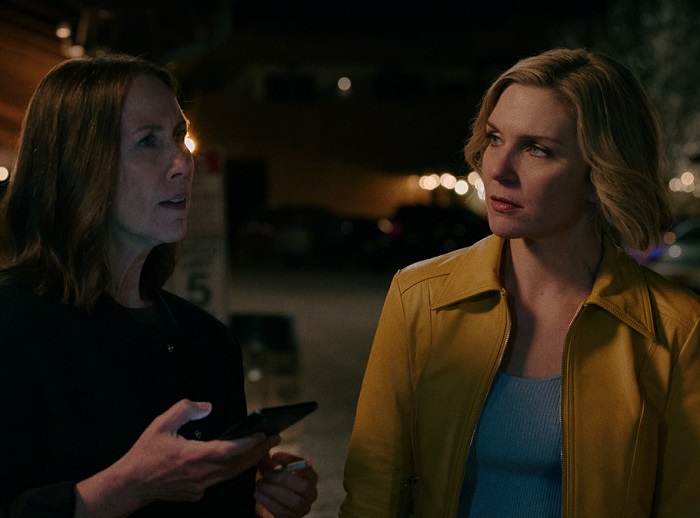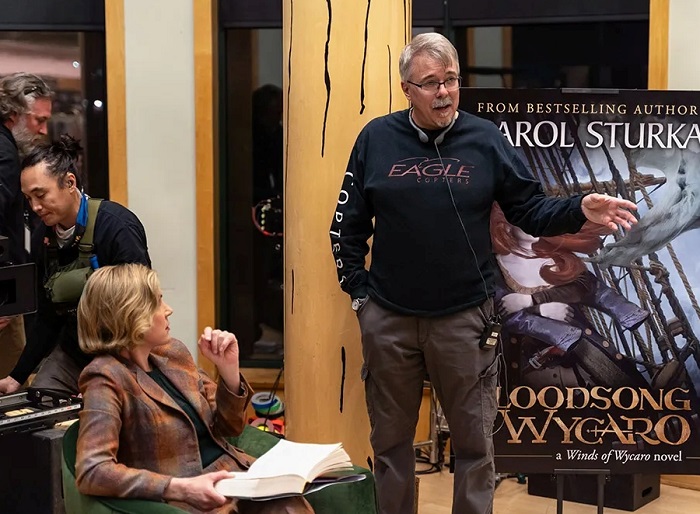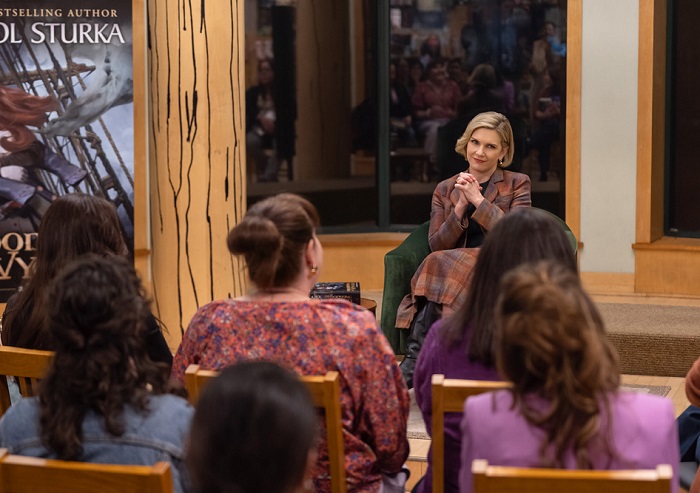by Gill Pringle in LA
After creating the iconic TV shows Breaking Bad and Better Call Saul, TV executives were begging Vince Gilligan for more. “And it was tempting,” recalls Gilligan. “I like working with Sony Pictures Television and they’ve been asking me for years: ‘Do you think you have another Breaking Bad or Better Call Saul story? Can we build a show around some of these other characters?’ And the short answer is: We could. We could do that. These actors are some of the best in the world, and all of those actors could carry their own show. But I don’t want to be that guy who doesn’t know when to leave the party. Probably my biggest fear was making people tired of the thing that came before, because I just won’t leave it alone. So that helped me decide to be somewhat courageous and try something new.”
58-year-old Vince Gilligan launched his career writing scripts for The X-Files, and today returns to those early sci-fi roots with his Apple TV series Pluribus. Having featured male protagonists in his past two shows, Gilligan further looked to shake things up by centering Pluribus on a female character. The nine-episode drama series – already picked up for a second season – is a genre-bending original in which the most miserable person on Earth must save the world from happiness.
The Latin motto of the United States, “E pluribus unum” translates as “Out of many, one” – a concept which Gilligan seized upon and ran with. “I can’t think of a better title. It feels right to me,” he muses, while at the same time admitting, “I was scared going into Pluribus because it was new.”
So, where do you turn when casting the “most miserable person on earth”? Gilligan looked no further than his Better Call Saul leading lady Rhea Seehorn to portray Carol Surka, an unhappy fantasy romance author – a woman who really has no right being miserable, given her successful career and loving marriage – when, suddenly, the world as Carol knows it ceases to exist. But it doesn’t end with a post-apocalyptic bang. It starts with a smile. Everyone on the planet is now in a blissful state of coexistence after a mysterious event joins the minds of almost everyone in the world. But is this utopia or dystopia?

One thing is certain: Carol feels very alone in this strange new reality. Both the “Others” and her fellow old-school humans seem surprised by Carol’s insistence that the new normal is a bad thing. Indeed, in an effort to help Carol navigate this strange new world, she is even given a chaperone, Zosia (Karolina Wydra), to help her see that happiness is at her fingertips. But Carol doesn’t want to be happy. She just wants things back the way they used to be.
If some actresses might question why they’ve been cast as the most miserable person on earth, Seehorn was actually joyous. “One of the great things that Vince does so well with all of his shows is that he knows that people are going to watch it and have questions about the world today, because that’s the world we’re watching it in right now,” says the twice Emmy-nominated actress who delighted as Saul Goodman’s ponytailed better half, Kim Wexler, in Better Call Saul. “But Vince doesn’t write themes and topics. I’ve known him for so many years, and I can tell you that he is writing about human nature, and it is causing people to come at that art from wherever they’re living in that moment, whether they are concerned about the world we’re living in now, because of politics or religion or AI or humanity, the plague of depression, the pursuit of happiness or the pursuit of liberty. He’s instead asking us to ask these questions about humanity. What does it mean to be a human? What does it mean to be happy? What does it mean to be content? What does liberty mean to you? He’s thrilled that people are going to have a lot of interpretations, and all of us would love nothing more than for this to inspire conversation.”

Pluribus is an idea that has been germinating for almost nine years in Gilligan’s mind, even when he was still writing Better Call Saul. “I came up with it during lunch breaks on Better Call Saul,” Gilligan explains. “I was interested in the idea of a person to whom the world was very nice. The world loved him. I didn’t know why at first, I didn’t have a reason for it, but everybody was very solicitous of him. They would do anything for him. And I was intrigued by that idea, and it took me a while to come up with a reason for that to happen, but in the meantime, I was getting to know Rhea Seehorn and just loved the work she was doing on Better Call Saul.

And that is when Gilligan decided that the “he” had imagined for years should, instead, be a “she”. “I really did write Pluribus for Rhea, and I’m so happy I did. She’s just fantastic in it,” he says. Gilligan has always delighted in letting audiences figure things out for themselves, rather than spoon-feeding his own thinking. And with Pluribus’ far-out concepts, it would be easy to imagine that he had AI in mind, but no. “I took so long to come up with this story so that AI as it exists now with Chat GPT and so forth, didn’t really exist except as a concept about eight or nine years ago. And also, people are probably going to say: ‘Well, it was about Covid, right?’ Well, no… I came up with the story before Covid as well. But I might have been thinking a little bit about social media because I don’t think it’s a good thing. It’s made us all a little harder on one another. It has technically connected us, yes, in ways that didn’t exist prior to its invention, but not always for the good.”

Gilligan continues: “And I hasten to add that I wasn’t really thinking in terms of themes. I was thinking more in terms of character, because when I thought of Breaking Bad, I was thinking about one guy – Walter White. Pluribus was similar in that this one character intrigued me. But having said that, I want people to watch this show, and hopefully they’ll like it, but I want them to talk amongst themselves as to what the show is about. It’s up to the audience to identify the themes of it, and I don’t know that there’s any wrong answer. I’d like to think that people can watch the show and say: ‘This is about AI.’ I’m like: ‘Fine, I won’t argue with you.’ ‘Or it’s about Covid.’ ‘That’s cool.’ At this point, I feel like it’s not my place to tell anyone what the show is about. I want them to receive it on their own terms and come up with their own meanings for it.”
For Seehorn, it was impossible to work on Pluribus without questioning her own level of happiness. “One thing that I thought about quite a bit after I was done, is that Carol wasn’t taking advantage of joy and happiness when she could have – before this whole world changed. She was constantly picking at what’s wrong with something, what is the flaw? Like, ‘what’s the thing I can find wrong with this event?’ Her wife, Helen, was the one that was more like: ‘Let’s just go. Let’s find what’s great about it, you know?’ And I am not somebody that picks things apart in real life, but it did make me just think about how I come from a place of gratitude, but I could do better to…. I spent a lot of time beating myself up for where I’m falling short of things, and I thought I might have just missed a moment for joy right there. And so that’s something that I think about right now.”
The rest of the Pluribus riddle, as Gilligan insists, is up to audiences to figure out…
Pluribus screens on Apple TV+ from 7 November 2025




